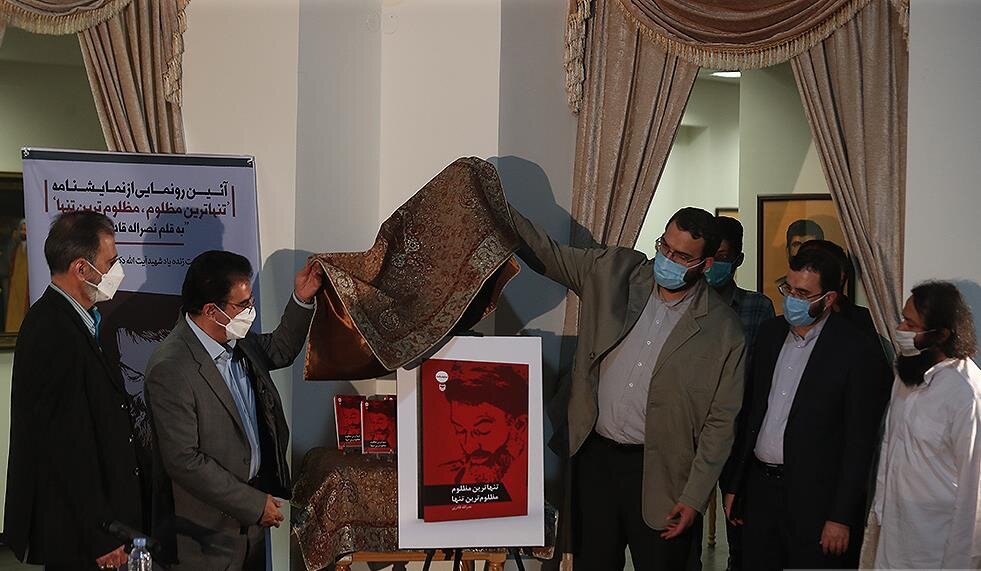Play on life story of Islamic Revolution ideologue Ayatollah Beheshti published

TEHRAN – A play recounting the life story of Ayatollah Mohammad-Hossein Beheshti, a main ideologue of the 1979 Islamic Revolution, has been published.
The play entitled “The Loneliest of the Oppressed, the Most Oppressed of the Lonely” has been penned by Nasrollah Qaderi.
It has been published by Sureh-Mehr, a major publishing house working under the auspices of the Art Bureau of the Islamic Ideology Dissemination Organization.
The play was introduced at the Shohadaye Enqelabe Eslami Cultural Complex in Tehran on Tuesday during a special meeting attended by Qaderi, Dramatic Arts Center director Qader Ashena, Art Bureau director Mohammad-Mehdi Dadman and a group of cultural figures.
“Based on a definition of Islam by Imam Khomeini, Martyr Beheshti designed a political structure, which is matchless compared to other existing political systems,” Ashena said in a brief speech he made during the meeting.
“He can be considered as the main architect of the political structure of the Islamic Republic,” he added.
Qaderi also talked about the play, which was previously called by its provisional title, “Another Ashura”.
“Research for writing the play began twelve years ago and its plot was written seven years ago,” Qaderi said.
“This play covers the life of Martyr Beheshti from his birth to his martyrdom and, in fact, it is docudrama written in seven acts typically based on my imagination,” he added.
He said that he is eager to stage the play if the necessary arrangements are developed and the play is not “mutilated” under governmental controls.
Earlier in June 2020, Qaderi also elaborated on this play.
“In this play, the story goes along with the event of Ashura and it begins with the death of Mohammadreza Kolahi Samadi, an Iranian dissident accused of planting a bomb at the Islamic Republic party’s headquarters and killing Ayatollah Beheshti and over 70 other people,” Qaderi said.
Kolahi was a member of the Mojahedin-e Khalq Organization (MKO) and was suspected of planting a bomb at the headquarters of the Islamic Republican Party (IRP) that killed more than 70 officials in 1981.
He added that the story is narrated by the wife of Kolahi, and the mother and wife of Ayatollah Beheshti.
“All the events are selected from documents and books about Ayatollah Beheshti as well as documents about his assassination,” he added.
Ayatollah Beheshti played a key role in establishing Iran as an Islamic republic in 1979.
On February 3, 1979, the founder of the Islamic Republic, Imam Khomeini, appointed Beheshti a member of Iran’s Islamic Revolutionary Council, and he soon became the council’s first secretary.
He also became the leader of the newly founded Islamic Republican Party (IRP), which was the most important group in the Majlis – parliament.
Considered one of the most powerful men in Iran, Beheshti played a leading part in the U.S. hostage crisis.
Kolahi was sentenced to death in absentia after fleeing the country in 1981. He was gunned down in front of his home in the Dutch town of Almere in December 2015.
Photo: Dramatic Arts Center director Qader Ashena (2nd L) and Art Bureau director Mohammad-Mehdi Dadman (3rd R) unveil a poster for the play “The Loneliest of the Oppressed, the Most Oppressed of the Lonely” at the Shohadaye Enqelabe Eslami Cultural Complex in Tehran on June 29, 2021. (SNN/Mehrdad Esfahani)
MMS/YAW

Leave a Comment